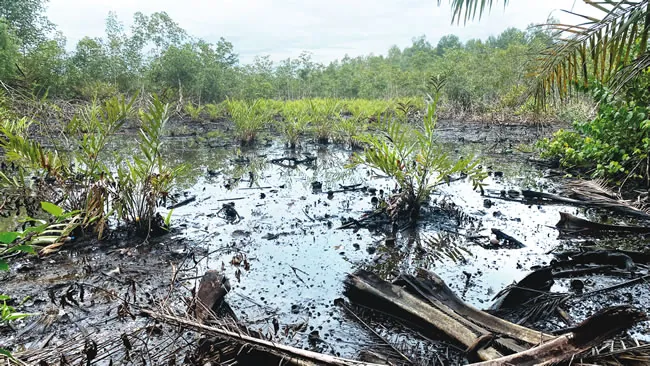In the heart of Nigeria’s oil belt, communities like Omadino and Uwakeno continue to live in conditions that starkly contradict the immense wealth extracted from beneath their soil and waterways. Despite contributing trillions of naira to the nation’s revenue, these Itsekiri riverine settlements in Warri South Local Government Area of Delta State remain cut off from essential infrastructure. They stand as living evidence of what many now call the paradox of the Niger Delta—abundant in resources, yet impoverished in reality.
The Niger Delta, sprawling across nine states and home to over 30 million Nigerians, has for decades served as the economic backbone of Africa’s most populous country. The region is blessed with rich biodiversity, vast reserves of crude oil, and intricate waterways that have long sustained traditional livelihoods such as fishing and farming. Yet, the same oil that fuels national development has brought pain and pollution to its host communities.
Since 1956, when Shell D’Arcy first struck oil in Oloibiri, Bayelsa State, Nigeria’s economy has become heavily reliant on petroleum. Data from the Nigerian Extractive Industries Transparency Initiative (NEITI) confirms that as of 2023, crude oil exports account for more than 90 per cent of Nigeria’s foreign exchange earnings and nearly 60 per cent of government revenue. But the residents of Omadino, Uwakeno, and countless other oil-rich towns have seen little of the prosperity this should have translated into.
Instead, they live with the consequences of decades of environmental degradation. According to a report by Amnesty International, over 13 million barrels of oil have been spilled across the Niger Delta since 1958—comparable to experiencing an Exxon Valdez-scale disaster every year for more than fifty years. The resulting damage to mangrove forests, farmlands, and freshwater sources has been catastrophic. The 2011 UNEP report on Ogoniland exposed that in some parts of the region, benzene levels in drinking water exceeded World Health Organization (WHO) safety standards by over 900 times. The report estimated that it would take 25 to 30 years to restore the polluted areas.
For the people of these communities, oil exploration has been less of a blessing and more of a burden. Fishermen now return with empty nets, farmers watch their crops fail, and families live beside oil pipelines that neither bring electricity nor hope. Gas flares light up the night sky, but their homes remain in darkness. What should be a beacon of development has instead become a daily reminder of neglect.
The injustices have not gone unchallenged. In the 1990s, civil resistance took shape with groups like the Movement for the Survival of the Ogoni People (MOSOP), led by writer and activist Ken Saro-Wiwa. His execution in 1995, alongside eight other Ogoni leaders, after a controversial military tribunal, sparked international outrage and led to Nigeria’s temporary suspension from the Commonwealth. Years later, the cycle of violence resumed with the rise of armed militancy in the 2000s. Groups like the Movement for the Emancipation of the Niger Delta (MEND) attacked oil installations and disrupted operations, prompting both military responses and a federal amnesty programme in 2009. While the amnesty brought temporary calm, the structural issues of environmental degradation, underdevelopment, and mismanagement remain unresolved.
Efforts by the government to intervene through the Niger Delta Development Commission (NDDC), established in 2000, and the Ministry of Niger Delta Affairs, set up in 2008, have done little to alter the living conditions in the region. In fact, both institutions have been dogged by allegations of corruption and inefficiency. A forensic audit released by the Federal Ministry of Finance in 2021 revealed that out of the N6 trillion allocated to the NDDC between 2001 and 2019, thousands of projects were either abandoned or never initiated.
The 13 per cent oil derivation fund, enshrined in Nigeria’s 1999 Constitution, was intended to compensate oil-producing states for the environmental and socio-economic impacts of crude oil extraction. This fund is meant to finance development in host communities. However, despite receiving trillions of naira in derivation allocations over the years, states like Delta, Rivers, and Bayelsa have failed to deliver significant improvements in public welfare. Many oil-producing communities remain without good roads, potable water, functioning schools, or healthcare facilities.
Recent findings suggest gross misappropriation of these funds. In Delta State alone, over N1.3 trillion of the derivation fund disbursed between 2015 and 2023 may have been misused. Agencies like the Delta State Oil Producing Areas Development Commission (DESOPADEC), which are supposed to channel resources to host communities, reportedly receive far less than their statutory allocations, limiting their impact.
For places like Uwakeno and Omadino, the reality is bleak. Surrounded by creeks and pipelines, these communities sit atop immense oil wealth yet lack the most basic social amenities. Children wade through polluted waters to reach makeshift schools. Women fetch water from streams laced with oil residue. Hospitals are non-existent or barely functional. The promise of development remains as distant as ever.
While some oil companies have made efforts through community development agreements and trust funds, these initiatives often fall short of addressing the depth of deprivation. Implementation is uneven, and many marginalized communities are excluded from decision-making processes.
The Niger Delta’s tragedy lies not just in its polluted land and poisoned waters but in the betrayal of trust, the broken promises, and the squandered potential. As oil continues to flow from the creeks of Omadino and Uwakeno into global markets, the people watch their land erode, their livelihoods vanish, and their hopes dwindle.
Until accountability is enforced, and oil wealth is truly redirected to the benefit of its rightful owners, the Niger Delta will remain a region rich in resources but scarred by injustice—a land where the black gold beneath the earth yields nothing but pain above it.
